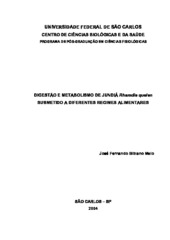Digestão e metabolismo de Jundia Rhamdia quelen submetido a diferentes regimes alimentares.
Abstract
This work was done at the Laboratório de Bioquímica Adaptativa, Departamento de Genética e Evolução, UFSCar, and at the Laboratório
de Bioquímica e Biologia Molecular da Universidade de Barcelona. We proposed studying digestive and metabolic features of fasted juveniles jundia Rhamdia quelen and fed on 20, 27 34 and 41% of protein in isocaloric diets. It was studied the hematological parameters, the immune system, the weight gain, the metabolic intermediates (glucose, lactate, pyruvate, free fatty acids, free amino acids, glycogen, protein, ammonia and urea), the digestive enzymes (unspecific proteases, trypsin,
chymotrypsin, amylase and lipase), the enzymes of protein metabolism and excretion (Alanine aminotransferase ALT, Aspartate aminotransferase AST, Glutamate dehydrogenase GDH e Arginase), and
the enzymes of the sugar metabolism (Glucokinase GK, 6-phosphofructo 1-kinase PFK1, Pyruvate kinase PK, FBP1, 6-phosphogluconte
dehydrogenase 6GPDH and Glucose-6-phosphate dehydrogenase G6PDH). We observed that the immune system of jundia was unaltered by the
nutritional changes. The digestive enzymes were responsive to the feed protein. The activities of the protein metabolism enzymes increased with
the dietary protein likely to the protein synthesis demanded by growth. Excretion of nitrogenous compounds as consequence of amino acids surplus was observed. The activity of some of sugar metabolism enzymes was changed and the concentration of metabolic intermediates was
altered with the availability of protein.
We concluded that the digestive enzymes of jundia are inductive, responsive to the dietary protein. The increase of protein in diets leaded to weight gain, higher production of nitrogen wastes, and gluconeogenesis for the metabolical demands.
